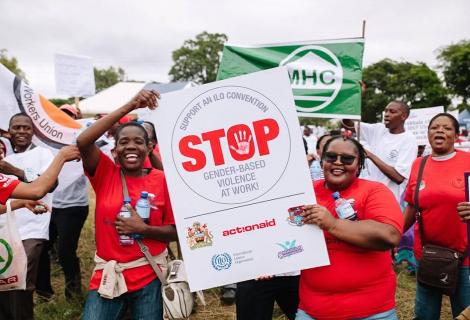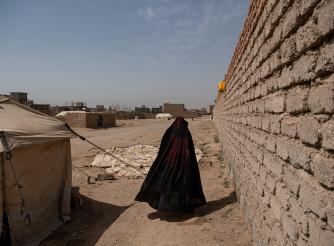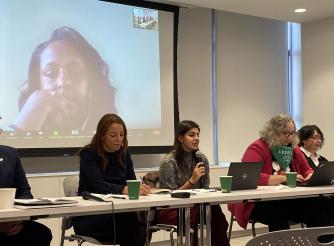Violence is not part of the job

States must ratify and implement the ILO Convention to end violence and harassment in the world of work
ActionAid and partners are calling on International Labour Organisation (ILO) member states to urgently ratify and bring into force new global legislation to end violence and harassment at work. Read our joint statement:
We applaud the recent adoption of the Convention (190) and Recommendation (R206) on Violence and Harassment in the World of Work at the Centenary International Labour Conference. This is a triumph for workers and trade unions all over the world, especially womxn trade unionists. We stand in solidarity with them and their ongoing struggles. It’s time now for States to ratify and implement the convention and recommendation.
This is the first ever international labour standard to address gender based violence and harassment in the world of work. Its adoption, with a two-thirds majority, is a testament to the power of workers, the tripartite system and multilateralism to advance human rights, workers’ and womxn’s rights. In a world ravaged by unprecedented inequality and corporate power, this is an affirmation of how important the International Labour Organisation is in protecting those this system puts at risk and for advancing gender equality. We welcome that the convention reaffirms the role of freedom of association and collective bargaining as essential to the protection of workers against gender based violence and harassment and the inclusion of the impact of domestic violence on workers.
The Convention is inclusive in its scope reflecting the reality that 65% of the world’s labour force, especially womxn workers in the Global South, is in the informal economy. It recognises informal and formal workers, public and private spaces as potential sites of violence, that violence can occur on the way to and from workplaces and that a majority of womxn workers don’t work in formal work spaces. Informal womxn workers and their organisations have ensured a historic win at the Centenary International Labour Conference by advocating for the rights of womxn working in streets and public places, such as vendors, traders, and waste pickers, and in private homes such as domestic workers and home based workers, acknowledging that working conditions, both in the formal and informal economy, constitute risk factors for violence.
The Convention is the first instrument that isn’t specifically related to the public sector that has explicitly included the public sector in its scope, and public sector workers and employers in the implementation mechanisms. This a milestone for the public sector, made up primarily of womxn workers who fought tirelessly for many years to achieve this global standard.
We also welcome the recognition that some groups of people are disproportionately affected by violence and harassment in the world of work and applaud the inclusion of people in situations of vulnerability to the rights to equality and non-discrimination in employment and occupation. The right to equality and non-discrimination in employment and occupation for womxn and members of groups that are disproportionately affected by violence and harassment, which, although initially omitted from an extensive list, were finally included after much discussion.
We urge States to take a progressive and inclusive approach in the implementation of this Standard, recognising workers in all their diversity and the multiple and intersecting forms of discrimination they may face, in particular they must robustly uphold the rights of young people and LGBTQI+ people to non-discrimination in the world of work.
The Convention and Recommendation ultimately reaffirm the critical role of the ILO, its mandate and the need for a human-centred approach to international trade, finance, economic and environmental policies. This role is ever more crucial in the face of rapid changes in the world of work and the world of care, due to free-market fundamentalism, attacks on collective bargaining and decent work, rampant austerity, widespread privatisation and climate catastrophe, which threatens gender justice, workers’ rights and human rights more broadly.
We call on States to ratify, and effectively implement the Convention and Recommendation without delay, in full and meaningful consultation with all workers, including informal workers, and their organisations.
Signatories:
ActionAid
APMDD - Asian Peoples' Movement on Debt and Development
DAWN – Development Alternatives with Women for a New Era
GAATW - Global Alliance Against Traffic in Women
Public Services International
WIEGO - Women in Informal Employment: Globalizing and Organizing


